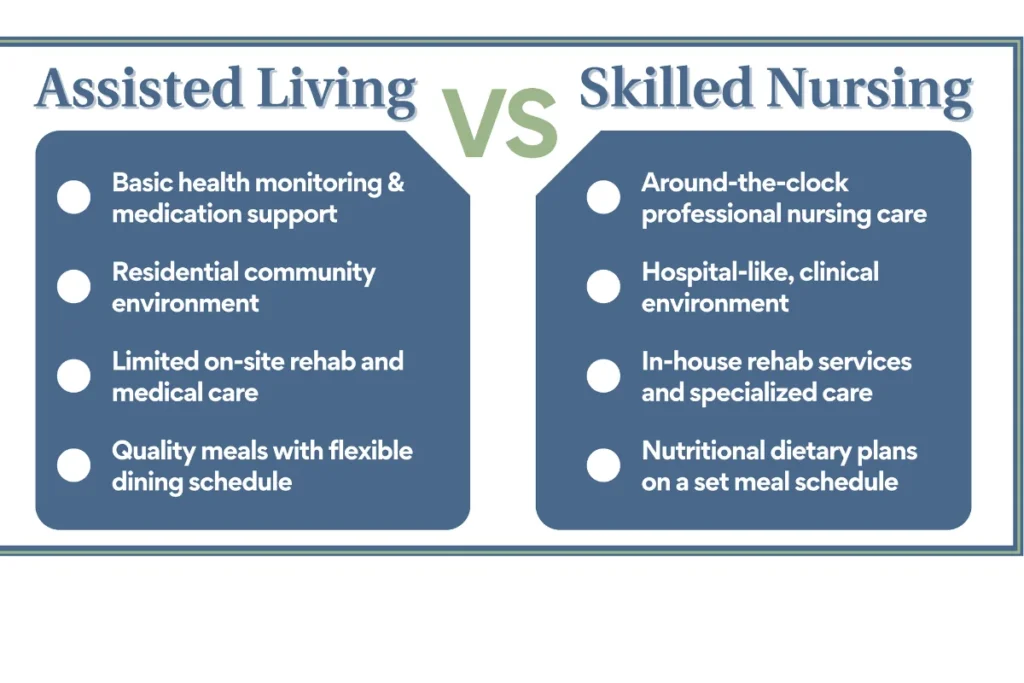What is a residential care home? It’s a place where individuals receive help with daily tasks in a comfortable, community-based setting.
This guide covers what residential care homes offer, how they differ from nursing homes, and key factors to consider when choosing the right care option for your loved one.
Table of Contents
What Is A Residential Care Home
A residential care home is a place where individuals receive personal care and support while living in a safe, comfortable setting. It helps with daily tasks like bathing, dressing, meals, and medication, making it ideal for those who need assistance but do not require full-time medical care.
Residential care homes provide:
- Private or Shared Accommodation: Comfortable rooms that can be personalised.
- Personal Care: Assistance with bathing, dressing, grooming, and mobility.
- Meal Provision: Nutritious meals catering to dietary needs.
- Medication Support: Supervision to make sure medication is taken correctly.
- Social Activities: Group events, recreational activities, and outings.
- Housekeeping and Laundry: Cleaning services and fresh linens.
- 24/7 Support: Staff available at all times for assistance and reassurance.
Read about the pros and cons of care homes to understand the benefits and challenges..
Types of Care Homes in the UK: Residential Care vs Nursing Care
Choosing a care home depends on the level of support needed. The two main types are:
- Residential care homes and
- Nursing homes.
Some facilities provide both, allowing residents to receive additional care if their needs change.

Residential Care Homes
A residential care home provides a safe place for individuals who need help with daily activities but do not require medical care. Staff assist with everyday tasks, creating a comfortable and social environment.
Nursing Homes
A nursing home offers everything a residential care home does but with 24-hour medical support from trained nurses. These homes are best for individuals with ongoing health conditions or those recovering from illness or surgery.
Differences Between Residential and Nursing Care Homes
| Feature | Residential Care Home | Nursing Home |
| Type of Care | Provides personal care and assistance with daily tasks. | Offers personal care plus medical supervision. |
| Medical Support | No medical staff, only trained carers. | 24/7 care from registered nurses for medical needs. |
| Medication | Staff supervise and remind residents to take medication. | Nurses administer medication and manage treatments. |
| Best For | Individuals who need help with daily activities but no medical care. | Those with ongoing medical conditions needing regular attention. |
| Mobility Support | Assistance with walking and daily movement. | Rehabilitation and physiotherapy for mobility issues. |
| Health Conditions | Not suitable for chronic or complex health conditions. | Suitable for residents with serious health conditions like diabetes, heart disease, or post-surgery recovery. |
| Environment | Home-like setting with social activities and community engagement. | More clinical environment with medical equipment and health-focused care. |
| Cost | Generally more affordable due to fewer medical services. | Higher costs due to round-the-clock nursing care. |
In addition to residential care and nursing care homes, there are other specialised care homes designed to meet different needs:
Dementia Care Homes
- Designed for individuals with memory-related conditions, such as Alzheimer’s and other forms of dementia.
- Structured routines help reduce confusion and anxiety for residents.
- Secure environments are created to keep residents safe while promoting mental stimulation.
- Staff are specifically trained to provide the necessary support for cognitive impairments.
- Focus on maintaining comfort, dignity, and mental well-being for residents.
Learning Disabilities Care Homes
- Cater to individuals with learning disabilities, providing care and support for daily living tasks.
- Focus on promoting independence through life skills and personal development activities.
- Support residents in gaining confidence and maintaining a sense of autonomy.
- Offer structured support to help with personal growth, education, and social activities.
- Provide a nurturing environment that encourages residents to achieve their full potential.
Respite Care Homes
- Offer temporary accommodation and care for individuals needing short-term stays.
- Provide family caregivers with a well-deserved break while assuring their loved ones are cared for.
- Deliver the same level of personal care as residential care homes, assuring comfort and safety.
- Allow individuals to enjoy a short stay in a supportive, safe environment.
- Ideal for individuals who need care but are not ready for long-term placement.
Dual-Care Homes (Residential and Nursing)
- Offer both residential care and nursing care in the same facility.
- Residents can transition between levels of care as their needs change.
- Provide flexibility for individuals who may need more intensive care over time.
- Ideal for individuals whose health may improve or worsen, requiring both personal and medical care.
- Makes sure continuity of care without the need to relocate to a different home.
If you’re researching alternatives, assisted living offers support while maintaining independence.
What Services Are Provided in a Residential Care Home?
A residential care home provides more than just a place to live. It offers a wide range of services designed to meet the personal, social, and medical needs of residents. These services may vary depending on the care home, but typically include:
Personal Care
Personal care is the main focus of residential care homes. Residents receive help with:
- Daily living tasks such as bathing, dressing, eating, and personal hygiene.
- Medication management to guarantee residents take their prescribed medications correctly.
- Mobility support, including assistance with getting in and out of bed, walking, or moving between rooms.
Meals and Nutrition
Residents are provided with nutritious meals throughout the day. Special diets are catered for, including:
- Low-salt, low-sugar, vegetarian, or halal options.
- Dietary support for conditions like diabetes or food allergies.
Housekeeping and Maintenance
Residential care homes provide regular cleaning services, including:
- Cleaning: Residents’ rooms are kept tidy, and common areas are cleaned regularly.
- Laundry: Bed linens, towels, and personal clothing are laundered by the home.
Social Activities and Engagement
To combat isolation, residential care homes encourage social interaction through:
- Group activities such as games, crafts, and outings.
- Opportunities for residents to connect with one another and build friendships.
At Metro Care UK, we offer the necessary support for individuals to live with dignity and independence.
When to Consider a Care Home: Key Signs
Deciding to move a loved one into a care home can be difficult, but there are key signs that indicate it may be time:
- Difficulty with Daily Tasks: Struggling with dressing, bathing, or preparing meals.
- Health Concerns: Ongoing medical conditions that require regular attention.
- Safety Risks: Increased falls, wandering, or forgetting medications.
- Loneliness or Isolation: A lack of social interaction can affect emotional well-being.
Benefits of a Residential Care Home
Choosing a residential care home comes with several advantages for both residents and their families:
- 24/7 Support: Staff are available round the clock for assistance.
- Personalised Care: Care plans are customised to each individual’s needs.
- Social Opportunities: Residents can interact with others and participate in activities.
- Safe and Secure Environment: Monitored spaces help prevent accidents and take care of their well-being.
- Professional Care: Staff are trained to handle personal care, medication, and other needs.
There are different care options available. Learn about the types of care homes in the UK to choose the best fit.
How to Pay for Residential Care
Understanding the cost of care is an important part of planning. Here are some common ways to cover expenses:
| Funding Option | Description |
| Self-Funding | Paying from personal savings, income, or assets. |
| Local Authority Support | If eligible, the local council may provide financial assistance. |
| Insurance | Some long-term care policies cover residential care costs. |
| Family Contributions | Relatives may help cover expenses where needed. |
Wondering about costs? Find out is a care home cheaper than a nursing home and what factors affect pricing.
How to Choose the Right Residential Care Home
Choosing a care home for a loved one is a crucial decision, and it’s important to consider several factors before making the choice:
1. Level of Care Needed
The first step is to assess the care needs of your loved one. Does your loved one require personal care or more specialised care, such as dementia care? If medical attention is needed, a nursing care home may be a better option. However, if your loved one only needs help with daily tasks, a residential care home may be suitable.
2. Location
Consider the location of the care home. It’s important for the home to be within a reasonable distance from family and friends so that they can visit regularly. Proximity to local amenities and medical services is also important.
3. Staff Qualifications and Training
The quality of care provided depends on the qualifications and experience of the staff. Check the staff-to-resident ratio (which is typically 1 caregiver per 5-8 residents) and make sure that caregivers have the proper training and qualifications to meet your loved one’s needs.
4. Reviews and Reputation
Research the reputation of the care home by reading reviews and speaking with other families. You can also check the home’s Care Quality Commission (CQC) report to make sure it meets regulatory standards.
5. Facilities and Activities
Look for care homes that offer a range of facilities, including:
- Comfortable rooms
- Common areas for socialising
- Gardens and outdoor spaces
- Activity rooms for crafts, games, and hobbies
What to Expect When Moving into a Care Home
Transitioning to a residential care home is a significant change. Here’s what to expect:
- Initial Assessment: Staff will assess needs and create a personalised care plan.
- Settling In: Families are encouraged to be involved in the process to make the transition smoother.
- Ongoing Care Reviews: Regular check-ins guarantee the right level of care is being provided.
Conclusion
A residential care home is a place where individuals receive help with daily tasks in a safe and comfortable setting. It provides personal care, meals, social activities, and support at all times.
At Metro Care UK, we offer professional care in a welcoming environment, helping residents live with dignity and independence.
Common Questions About Residential Care Homes
Who Would Access Residential Care?
Residential care is for individuals who struggle with daily tasks such as washing, dressing, or managing meals but do not need medical care. It is commonly used by older adults, those with physical disabilities, and people needing long-term support in a safe, community-based setting.
What Is Meant by Residential Care?
Residential care refers to living in a care home where trained staff provide personal support with daily activities like washing, dressing, eating, and medication. Unlike nursing homes, it does not include full-time medical care but offers a secure and social environment for those who need extra help.
Can You Be Forced Into Residential Care?
In the UK, no one can be forced into residential care unless they lack mental capacity and a legal decision is made in their best interests under the Mental Capacity Act 2005. In most cases, individuals and their families make the choice together, with support from social services if needed.

